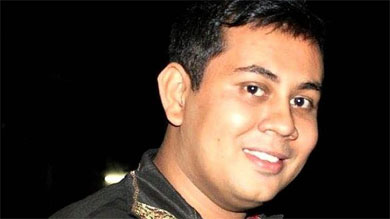By Kamlesh Singh
7 August 2015

Niloy Neel
Niloy Neel is dead. Just after Juma prayers, five men, posing as possible tenants, climbed up to his flat in Dhaka’s Gorhan area and slaughtered him. His face was mutilated beyond recognition. He feared for his life because he was warned about death by machetes.
Islamism
The Bangladesh government knew about the threat. Yet, he became the fourth secular activist in Bangladesh to die this year. The Islamists kept their word, for the fourth time. The state couldn’t keep its promise to protect a citizen, for the fourth time. Niloy Neel, atheist blogger, hacked to death like Ananta Bijoy Das, Rajib Haider, Avijit Roy, Wasiqur Rahman…the list goes on. The Awami League government led by Sheikh Hasina is perceived to be tough on Islamists. The government has been steadfast in ensuring capital punishment for the Islamists who sided with Pakistan and Jamaat-e-Islami in Bangladesh’s War for Liberation in 1971.
Yet, when it comes to the recent rise in new Islamism, inspired by Al-Qaeda, her government is found wanting. A group of murderers, in the name of Islam, have managed to kill at least 10 secular activists after making public threats. If it were a religion, atheism would be quite a populous one, and definitely the fastest growing faith. Alas, it is not a faith. But the defenders of faith believe that atheism poses a threat to religion. It’s true, but not in the way the faith fighters believe it is. Religion is under threat not because atheism is stronger, but because religion is becoming weaker by the day. As more and more people have access to better education and mankind sends machines to fly by Pluto, the mysteries of the universe are unveiled and wonders of mythology unravelled. This process is religion’s biggest challenge. The secular atheists of Bangladesh do not attack Islam as much as they attack the dogma attached to Islam. They target the virulent streak of extremism, which actually may be the bigger enemy of Islam, yet the Islamists consider a bunch of bloggers Islam’s biggest enemy.
Speaking the truth becomes a little more difficult every time a free thinker and writer dies at the hands of Islamists, who adhere to a strict version of homogenised Islam. This goes against the idea of Bangladesh, which broke away from Pakistan because Bengalis did not believe that faith was above people. Islam was not the glue that could keep two peoples together. Culture proved to be a stronger bind. However, enemies of this idea continue to not only operate, but flourish in Bangladesh today.
Bangladeshi writer Taslima Nasreen had to leave Bangladesh. She chose to live in Kolkata. She couldn’t, so she made Delhi her home. Today, she lives in the US and Europe, because the atmosphere is not conducive even in India, where multiple faiths have coexisted more or less peacefully for centuries. Today, the subcontinent is unsafe for her. In Pakistan, the uninterrupted democracy of the recent times has failed to control the rise in extremism. The rise of the IS in the Middle East-North Africa region has reignited the Caliphate dream among hardliners. In a multi-cultural, multi-faith secular country like India, the rise in religious orthodoxy has led to competitive dogmatism and extremism.
Discourse
The covert Pakistani war in Kashmir has an overt Islamist side to it. Asaduddin Owaisi has moved on from his Hyderabad fief, and aspires to be the leader of all Indian Muslims. His popularity rises a notch every time he toughens his tone. Muslims were never as enraged at the hanging of a convicted terrorist as in the recent case of Yaqub Memon. Not because he was a Muslim, but because two Sikhs, convicted for terrorism, haven’t been hanged because the top religious body of Sikhs has already warned of consequences. That is how religion has vitiated the discourse. But there is a silver lining to this darkness. The anger over Yakub’s death did not flare up as feared. It instead found an outlet in speech and reasoned debate.
Delusion
Religion gets exposed almost every day, and that has been chipping away at its very foundation. It’s not yet a takedown, so it’s not noticed. Fatwas are ignored; dikats of the dharma gurus are largely dumped. Look at the demolition of some heads of sects. Asaram Bapu is in jail. He still has quite a following, but that aura of holiness is gone. At this piece goes to press, Radhe Maa’s divine delusions lie in tatters. One may argue these are small-time operators who ran out of luck.
What are religions but unusually large sects with unusually large following? Religion enjoys a grip on people because death is a truth most people can’t digest. We can’t believe death is the end. The idea of a hereafter is still the best antidote to the fear of death, and religion offers people that opiate. People who stand against this delusional obscurantism, challenge this grip. Some like Niloy Neel risk being hacked to death. But words do not die, neither do truth nor reason. Religion will be weaker tomorrow than today. The world will be a better place tomorrow than it is today. Amen.
Kamlesh Singh is Managing Editor, India Today Group Digital
Source: dailymail.co.uk/indiahome/indianews/article-3189610/Speaking-truth-gets-difficult-time-freethinker-murdered-Islamists.html#ixzz3iJbBcIN2




 Moderate Islamist here
Moderate Islamist here


0 comments:
Post a Comment